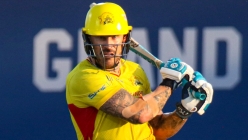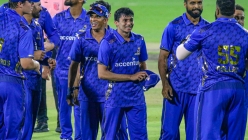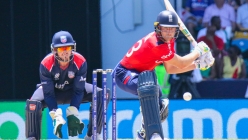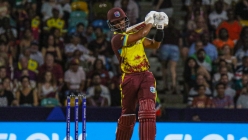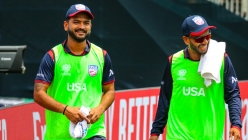Views
USA Cricket: 2019 ICC T20 WCQ Americas Regional Final Report Card Part 3 – Outlook for the Future
2019 Aug 29 by DreamCricket USA
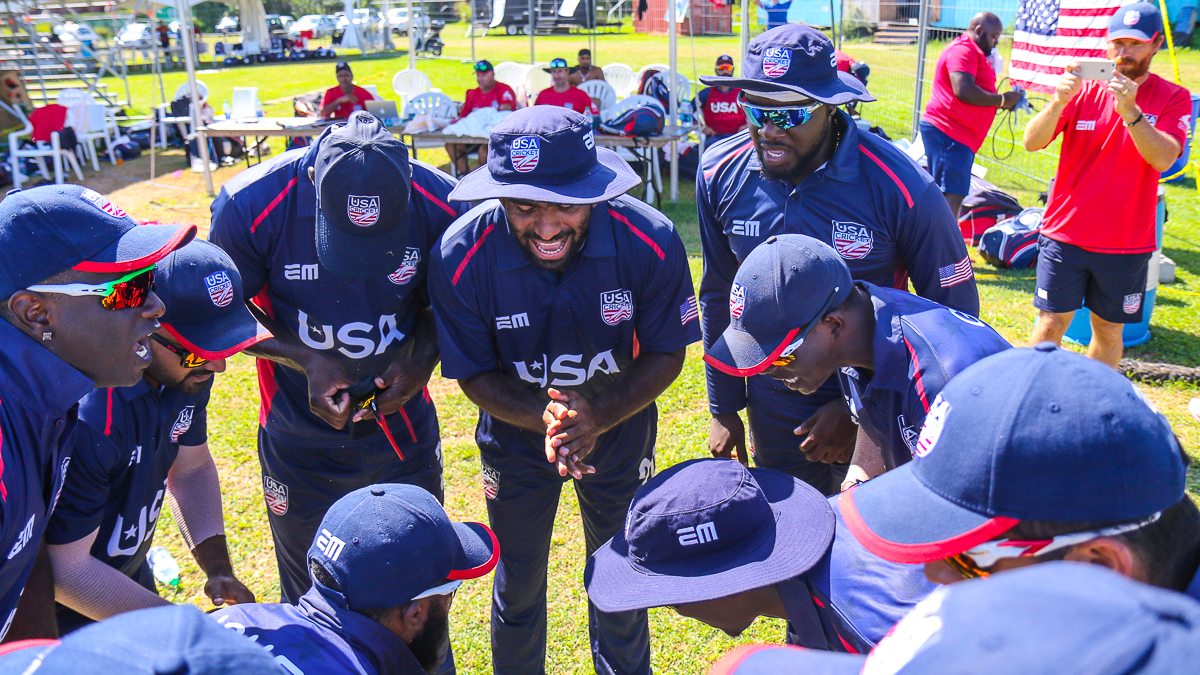
By Peter Della Penna (Twitter @PeterDellaPenna)Photo credit: Peter Della Penna
In part three of DreamCricket's tour report card breakdown of the disappointing tour of Bermuda for 2019 T20 World Cup Qualifying, recommendations are made to address glaring issues with the squad and national team structure to prevent a repeat of this poor performance in the future.
1 - Don’t hire coaches on three-month contracts
That’s precisely what the crew of Kiran More, Sunil Joshi, Pravin Amre, David Saker, Kieran Powell and James Pamment received from USA Cricket after Pubudu Dassanayake jumped before he was pushed out the door in July. For all of USA Cricket’s statements about increasing the professionalism of the organization, it’s hard to find too many examples of a head coach or high performance director whether in cricket or another pro sport being given a three-month contract and asked to reshape the organization’s path to success in that time.
That kind of role is tasked with setting the vision and direction of a national team program structure over several years requiring an extended full-time commitment. It can not be realistically accomplished by someone filling up space as a short-term rental.
It’s also ideal to at least make an attempt at establishing some semblance of a transparent process to achieve that. Followers of the national team may have found it somewhat curious that just hours after Pubudu Dassanayake’s resignation was reported, USA Cricket already had a ready-made press release announcing More and his crew as the new coaching staff.
There was no application process. There wasn’t even a headhunting process. It was simply a case of several board members bringing in some of their old pals from India along with a few others who were recommended.
While ostensibly there was a long-term administrative vision of USA qualifying for the 2020 T20 World Cup, it was contradicted not just by the length of the contracts handed out to the new coaching staff but by some of the activity that took place within those contracts. More left USA’s camp in Los Angeles midway through to go watch India play West Indies in Florida for a weekend, spending part of that time having mentoring meetings with India wicketkeeper Rishabh Pant in between the pair of T20I matches in Lauderhill at the behest of India head coach Ravi Shastri. These do not seem like the actions of somebody who has USA Cricket and its players as his number one priority.
More also did not travel with the team to Bermuda. According to multiple sources, Joshi was asked by More to serve as head coach of USA on tour in Bermuda in an email that was sent only after the team had arrived in Bermuda, just days before the tournament began with the first match against Bermuda. Such actions conveyed a lack of genuine planning and muddled leadership structure that created confusion in the minds not just of Joshi and the other two coaches on tour – Saker and Pamment – but more importantly the players themselves. That was reflected by the performance on the field.
USA Cricket hyped up their three-week training camp in Los Angeles as “first of its kind” and “historic” that was paving the way for professionalism. Numerous board members who came with More to the India v West Indies T20Is in Florida in the first week of August happily patted themselves on the back at how they had organized everything. But what actually went on at this camp is somewhat vague.
When asked what a typical day consisted of at this camp, More said during the India v West Indies matches in Florida that players trained for at most two or three hours and then had the rest of the day to themselves, something confirmed by other sources. When questioned why players were spending so little time training if they were now on full-time contracts, at least in the sense that it was not anything over and above a typical training day when they were unpaid amateurs, More responded that, “It’s the quality that counts, not the quantity.” The results in Bermuda fly in the face of such claims about “quality” because this was USA’s worst tournament performance in their limited overs history.
According to other sources, so much free time on the hands of the players in Los Angeles was actually counterproductive and many players felt frustrated at the lack of activity. According to one squad member, “Coach Pubudu would have only needed one week to do by himself what the entire crew of new coaches stretched out into three weeks. We wasted a lot of time in Los Angeles doing nothing and became too relaxed.” That also showed on field. Many players looked lethargic and a sense of urgency was lacking throughout the matches at bat and in the field.
Again, this starts from the top. Now that the T20 World Cup plans have gone up in smoke, USA’s training camp that had been scheduled for the National Cricket Academy in Bangalore, India from September 21 through October 11 ahead of their anticipated appearance in the UAE has been canceled. There is also every possibility that the More crew will pack up and leave as soon as the September ODIs in Florida are done, never to be seen again when their initial three-month contact term is up because the path to the 2020 T20 World Cup in Australia is shut. If that happens, it will further highlight the mess that certain board members have created by working to push Dassanayake out the door after he helped lead USA to ODI status in April. As the old adage goes, if it ain’t broke, don’t fix it.
2 - Adhere to the team rule about speaking English in team settings
One of Dassanayake’s rules that was put in place awhile ago to promote unity within the cross-cultural dynamic of the USA team was for players and coaches to speak English in official team settings wherever possible, with minor allowances given between bowler and wicketkeeper if necessary to discuss strategy in a different language without the opposition batsmen at the crease being able to understand it. Officially, it still exists as a team policy on paper.
But in practice, this rule went out the window on day one in Bermuda and it started from Sunil Joshi, the acting head coach. Joshi could be regularly heard shouting in Hindi to players on field and others on the team soon followed, regularly giving advice or instructions to each other in Hindi or Gujarati. Debutant fast bowler Cameron Gannon’s most commonly used phrase throughout the first several days on tour was shouting back to the USA team tent, “ENGLISH! ENGLISH, GUYS! SPEAK ENGLISH! WE CAN’T UNDERSTAND YOU!” Midway through the tour, he gave up seemingly in frustration.
Gannon’s exasperated cries turned into a running joke among Bermuda and Canada players who commented about it to this journalist over the course of the week on tour. Seeing multiple players besides Gannon also express their frustration on field with communication barriers from USA’s team leadership gave Bermuda and Canada players a major lift in the field and gave them the impression that USA’s squad was dysfunctional. One player stated that, “This was the least cohesive USA squad I have ever played against, at U-19 or senior level.” His feeling was that it stemmed from USA’s players and coaching staff not being able to communicate effectively with each other on field.
Gannon’s body language and attitude issues were mentioned in the Player Grades portion of the tour review, but it’s hard not to wonder how isolated he must have felt if his pleas to coaches and teammates to speak English went ignored. A common response to his pleas was being told, “Don’t worry about it, we’ll tell you what it means later.” Whether it was Gannon or some of the West Indian heritage players having their pleas ignored, it led to factions being created off the field, something that was a common occurrence in the USACA era that led to disjointed performance and lack of chemistry on the field. If the head coach is doing it, it becomes near impossible to police the players when they do the same. This is a habit that needs to be nipped in the bud or else it may fester into an even bigger issue.
3 - Hire a Sports Psychologist
USA Cricket administrators have gotten busy hiring numerous full-time back-room staff members in the last year in an effort to help improve overall team performances. A technical analyst, strength & conditioning coach, physiotherapist, batting coach, pace bowling coach, spin bowling coach. But one role they have never addressed and something that is extremely common in many professional sports teams in the modern era is having a sports psychologist on staff, or at the very least contracted as a consultant.
Many of the problems experienced by USA players in the past can be traced to lack of confidence or mental blocks that have held them back on the day from being able to perform to the capabilities of their obvious technical skills. That was on evidence in Bermuda as well. Countless players seemed held back by what was going on between their ears instead of any sort of pressure being applied by opposition bowlers and batsmen. If they can consult with someone trained in this area when necessary, it may help curtail prolonged performance lapses on tour.
4 - Admit that you failed + make plans to rectify the failure
USA Cricket issued “a statement” on Wednesday to address the team’s performance at the T20 World Cup Qualifier Americas Regional Final in Bermuda. In reality, it was a pathetic, weak response summed up best by a quote from new USA Cricket CEO Iain Higgins. There seemed an inability to grasp or confront what a massive failure this tournament was, particularly the fact that USA had never lost to Bermuda in T20 cricket before last week and had never fallen short of advancing to the T20 World Cup Qualifier since their first appearance in 2010.
“Although we are disappointed in our own performance, we’d like to congratulate all the countries and the Americas Regional Office staff for an outstanding event,” Higgins said. “We will reflect carefully on how and why we fell short of our targets at this event and we now have an opportunity to put together a longer-term high performance program for the men’s national squad that will help the team to return better prepared during the next T20 World Cup cycle.”
Excuse me? “Better prepared”? But everyone was told 11 days earlier in another press release that the “historic” three-week training camp in Los Angeles “resulted in across-the-board improvements for the team and positions them for success” in Bermuda.
After rolling their eyes at the August 17 press release, numerous fans and observers have shared the most recent press release from Wednesday on social media and Whatsapp groups with head-scratching mockery, including one person who described it as “completely tone-deaf.” Imagine Hillary Clinton saying in a concession speech to Donald Trump in 2016, “I will now have an opportunity to put together a longer-term fundraising campaign to come back better prepared for 2020.”
Compare USA Cricket’s statement to one sent out as a letter to season-ticket holders by New York Giants co-owners John Mara and Steve Tisch upon the firing of then head Ben McAdoo and general manager Jerry Reese during the 2017 season. The Giants had come off a playoff appearance in 2016 and were expected to challenge again for a strong Super Bowl push in 2017 but instead found themselves 2-10 after week 13, when McAdoo and Reese were canned.
“This season has been extremely disappointing for our organization, and we determined now was the right time to make these changes,” Mara and Tisch wrote in the apology letter to season-ticket holders. “As owners of this franchise, our goal is to deliver the highest quality of football to you, and we know we have fallen short of that goal this season. We will conduct a diligent and thorough search for a new head coach and general manager. We know you and all of our fans have been frustrated this year, and many of you have voiced your disappointment and displeasure. Your passion for our franchise does not go unnoticed.”
Fans are not stupid, whether it’s USA Cricket or some other team in another sport. Don’t treat them like they are.
[Views expressed in this article are those of the author, who was present at all of the team’s matches on tour in Bermuda, and do not necessarily represent the views of DreamCricket management. If you have different views or opinions, we respect those views and urge you to provide your feedback, both positive and negative. Feel free to respond to the author via Twitter @PeterDellaPenna.]
Read Part 1 - Team Grades, and Part 2 - Player Grades.
